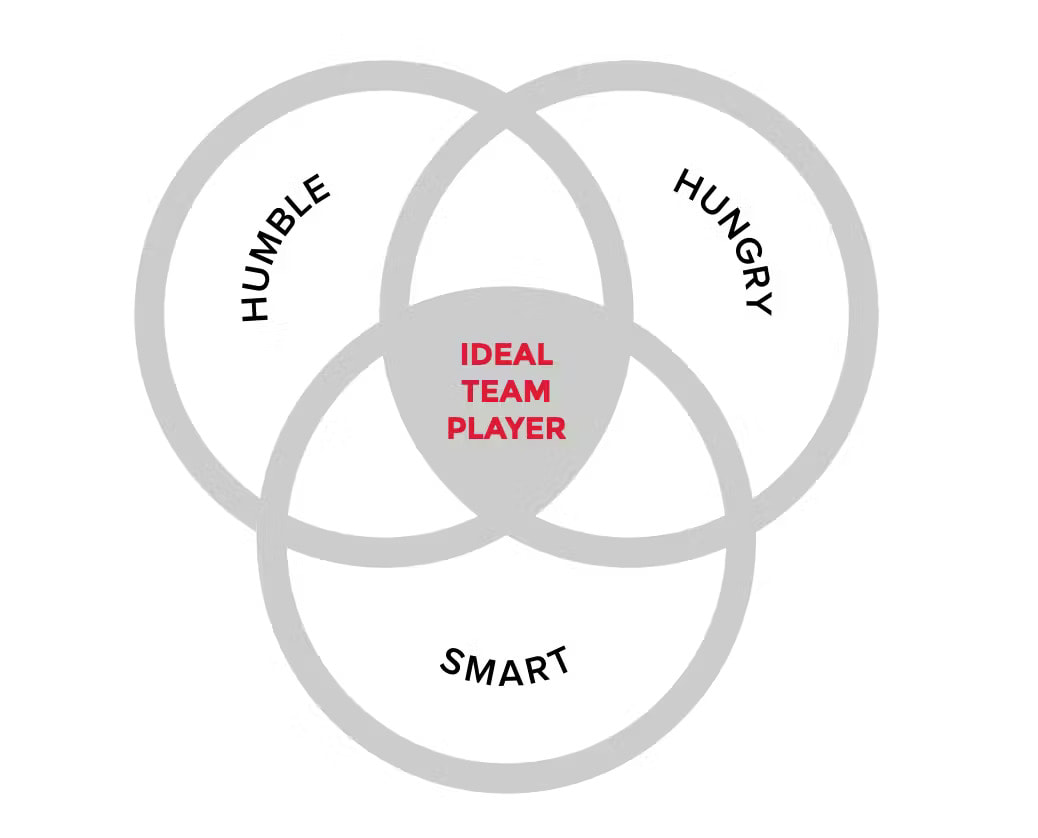|
Why is it that you work wonderfully with some people, but keep clashing with others? In his 25 years of executive coaching, executive coach and bestselling author Patrick Lencioni has distilled three characteristics that make a successful team player. In today's article I will show you which qualities make an ideal team player, what happens if just one of these qualities is missing and how you can develop your team into ideal team players. The three characteristics of an ideal team player
Trait 1: Be humble
Modesty is probably the most important quality that makes ideal team players. Specifically, “being humble” means :
On the contrary: Ideal team players consciously use their skills to advance their team. Only they do it with the necessary understatement, without calling for attention and applause. If people lack this form of modesty, it can make working in a team considerably more difficult. Trait 2: Be hungry Ideal team players are passionate about what they do and hungry for more.
Trait 3: Be smart Ideal team players are smart, namely "people-smart". This does not mean their IQ, their cognitive abilities or their professional competence.
Then it becomes difficult to work together Humble, hungry, smart: As simple as these three qualities sound. The key is that all three qualities must be combined in a person so that this person can become the ideal team player. If only one of the three characteristics is missing, working with this person becomes a challenge. Four examples from my practice Case study 1: When smartness is lacking Peter manages more tasks in the team than three other colleagues together. Status and recognition from outside are not important to him, because he is passionate about the cause and is hungry and passionate about it. What Peter lacks, however, is the sense of how his actions and his comments affect those around him. That's why it regularly happens that Peter unintentionally steps on his colleagues' ties, causing displeasure and confusion. Case study 2: When there is no hunger Paul is good with other people. He is people-smart and humble. Selfish motives are completely foreign to him. But he lacks the hunger to advance his team and try new things. Most of the time he only does what is absolutely necessary. This is frustrating for his teammates, who often work longer hours than he does and often have to ask him to contribute. Case study 3: When modesty is lacking Mary is hungry and smart. She says the right things at the right time, works hard and is a committed team player. However, she is mindful of her own advantage and influences her colleagues in her favour. She lacks the modesty that makes a good team player. Case study 4: When modesty and smartness are missing It is even more difficult to work with people who lack two of the three characteristics of an ideal team player. Ringo is hungry, but he lacks the humility and the sense of what his actions are doing to others. With his unbridled actionism, he often overruns his teammates like a bulldozer, regardless of the losses. This is how you develop your team into ideal team players Working in a team is easy for some people. Others find it harder to work collectively towards a common goal. No matter what spectrum you and your team are currently on: I am convinced that everyone can improve their ability to work in a team. What it takes is time, patience and good coaching. I would like to give you a simple 4-step plan that you can use to assess where you currently stand with your team and how you can continue to develop towards the ideal team player. In 4 steps to the ideal team player [Instructions] As with all management issues, the same applies here: If you want to improve cooperation in your team, then start with yourself. 1. Do a Self-assessment Assess yourself which of the three core characteristics of an ideal team player are the strongest, second strongest and weakest in you. You are welcome to use Patrick Lencioni's free self-assessment tool for this purpose. 2. Share Results Share the results of your self-assessment with your team and explain why you assessed yourself that way. What is your weakest trait, what is your strongest? Have each team member, in turn, present the results of their self-assessment and also explain why they assessed themselves that way. 3. Create a Development Plan Now go in twos, threes, fours…. with colleagues who had given the same quality as you in third place. Now consider together what each of you can do to become stronger in this area. Find one or two specific resolutions and record them briefly and concisely in your personal development plan. 4. Mutual Coaching Present this development plan to the rest of the team and ask them to point it out to you if you fall back into old patterns. With this openness and the trust that your teammates will support you in your resolutions, you will see the first development successes after a short time. Incidentally, I stick such intentions in a striking way on the monitor so that they are visible to me and the people around me. Conclusion You now know the three core qualities that make an ideal team player. What you can do with it is versatile:
Personally, I am convinced that everyone can become a better team player - with the necessary time, patience and the appropriate coaching. But not every manager and every employee fits into every team. It is all the more important that entrepreneurs and managers ask themselves the question: “Which culture is a conducive culture for my organization, in my market, in my environment and for our business model in order to achieve my corporate goals?” From this you derive what kind of team player you need in this context. From my point of view, two things should be non-negotiable:
https://justgrow.eu/blog/ If you're interested in reading more of Olaf articles please visit the website link above. (Please note that Olaf's site is in German but Google translate does an excellent job of instantly translating it to English.) How can you elevate your people to the next level? To find out what you can improve in your leadership team to grow more easily, quickly and profitability, try our complimentary Agile Growth Checklist. This self-service questionnaire takes 5 to 10 minutes to complete. You'll receive the checklist with your responses immediately. Within 24 hours, you'll receive a compiled report highlighting areas to improve. This report is complementary and involves no obligation. Complete section 1 and 4 to check your leadership team* and accountability processes*. Or complete all 7 sections to find out how your company is doing in each of the 7 areas needed to produce more rapid, profitable and sustainable growth. Comments are closed.
|
Archives
December 2029
Categories
All
|



 RSS Feed
RSS Feed
